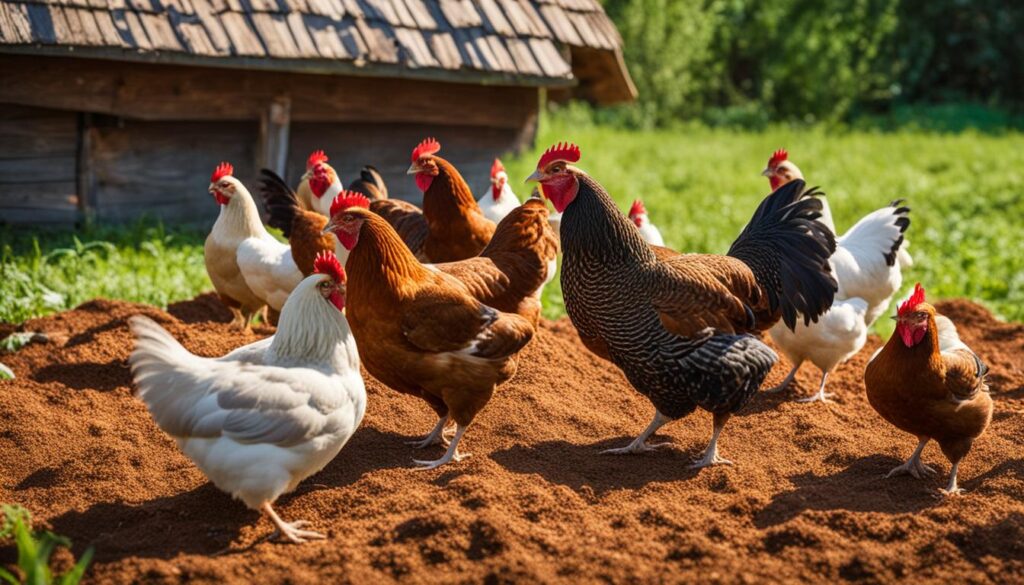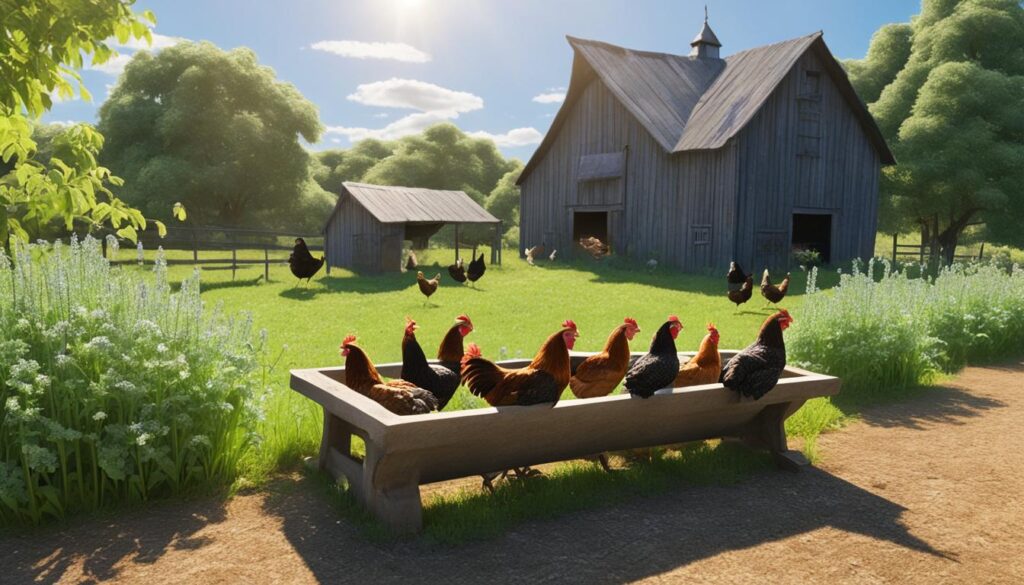As a dedicated hobby farmer, I’m always on the lookout for natural ways to promote the health and vitality of my backyard chickens. Among the plethora of possibilities, chia seeds have emerged as a standout supplement. Rich in omega-3 fatty acids, packed with antioxidants, and brimming with essential nutrients, these tiny seeds are massive powerhouses for chicken wellbeing. I’m excited to share how integrating chia seeds into your chickens’ diet can play a significant role in nurturing a thriving, vibrant flock.
Key Takeaways
- The exceptional nutrient content in chia seeds supports overall chicken health.
- Including chia seeds in the diet can contribute to the vitality and energy of backyard chickens.
- Omega-3 fatty acids found in chia seeds offer numerous benefits for the flock’s feather and eggshell quality.
- Antioxidants in chia seeds help fortify chickens against oxidative stress, enhancing flock longevity.
- Chia seeds are a versatile addition to a chicken’s diet, easily mixed into standard feed or offered as a treat.
- Regularly feeding chia seeds to your chickens can lead to noticeable improvements in their overall well-being.
The Nutritional Benefits of Chia Seeds for Chickens
As a hobby farmer, I’ve witnessed a significant change in my flock since introducing a nutrient-rich supplement into their diet. Chia seeds, renowned for their high concentration of omega-3 fatty acids and antioxidants, have proven to be more than just a human superfood; they’re a powerhouse for backyard poultry nutrition as well. Let’s delve into the specifics of how these small but mighty seeds can make a big impact on your chickens’ health.
Understanding the Nutrient Profile of Chia Seeds
Chia seeds offer a myriad of health benefits for chickens due to their impressive nutrient profile. Each seed is packed with essential nutrients that contribute to a chicken’s overall well-being. The rich source of antioxidants in chia seeds helps combat oxidative stress, while the omega-3 fatty acids promote vibrant, lustrous feathers and aid in the development of healthy eggs.
My birds have enjoyed the addition of chia seeds to their regular diet, and I’ve noticed an increase in vitality and egg quality. It’s the substantial levels of calcium, phosphorus, and protein that seem to bolster their bone health and, in turn, enhance eggshell strength. Here’s a closer look at what these seeds have to offer:
- Omega-3 Fatty Acids: Essential for brain health and feather development
- Antioxidants: Protect tissues from oxidative damage
- Calcium: Fundamental for strong bones and eggshells
- Phosphorus: Works in conjunction with calcium for skeletal integrity
- Protein: Necessary for growth, repair, and producing high-quality eggs
Comparing Chia Seeds to Traditional Chicken Feed
The comparison of chia seeds versus traditional chicken feed is quite revealing. While commercial feed provides the necessary nutrients to keep a chicken healthy, chia seeds are a superior supplement that can enhance your chickens’ diet significantly. Let’s break down the differences in a table format:
| Nutrient | Chia Seeds | Traditional Chicken Feed |
|---|---|---|
| Omega-3 Fatty Acids | High Levels | Varies with Feed Type |
| Antioxidants | Abundant | Minimal |
| Calcium | Rich Content | Adequate Levels |
| Phosphorus | Optimal Ratio with Calcium | Standard Ratio |
| Protein | High-Quality Protein | Standard Quality |
Incorporating chia seeds into your chickens’ diet can bridge the nutritional gap that is sometimes present in regular poultry feeds. As nourishing as commercial feeds are, the addition of chia seeds elevates the feed’s nutritional value, offering a natural and holistic way to support your backyard flock’s health.
The journey towards optimizing backyard poultry nutrition does not require drastic changes but rather small, consistent steps. By integrating chia seeds regularly, you’ll provide your chickens with a nutrient-rich supplement that complements their diet and supports their long-term health and productivity.
Introducing Chia Seeds into Your Chicken’s Diet
My journey with incorporating chia seeds into my backyard chicken care regimen has been a game-changer for my feathered friends. Not only have I observed an uptick in their overall health, but I’ve also cracked the code on feeding them this superfood in just the right amount. Let’s delve into the specifics of a chia seeds feeding guide to ensure your chickens benefit fully without going overboard.
How Much and How Often Should Chickens Eat Chia Seeds
When it comes to proper chia seed portions for chickens, moderation is key. I recommend starting with a small sprinkle over their regular feed—a teaspoon per bird should suffice. This small introduction allows them to get accustomed to the new taste and texture. Gradually, you can increase the amount to a tablespoon daily, ensuring they are well-tolerated and beneficial to their diet.
Best Practices for Feeding Chia Seeds to Your Flock
Implementing best practices in your backyard chicken care strategy when feeding chia seeds is essential. Here are some guidelines I’ve followed:
- Always introduce chia seeds gradually to monitor for any adverse reactions.
- Ensure that the seeds are organic and free from pesticides to keep your chickens healthy.
- Mix the chia seeds in with their usual feed to promote ease of ingestion.
- Observe your chickens after introducing chia seeds and adjust portions accordingly to their size and dietary response.
In tandem with these tips, the visual guide below has helped me maintain a balanced diet for my flock.
| Chicken Size | Starting Portion | Maintenance Portion |
|---|---|---|
| Small/Bantam | 1/2 teaspoon | 1 teaspoon |
| Medium | 1 teaspoon | 1.5 teaspoons |
| Large | 1.5 teaspoons | 1 tablespoon |
Remember, the key is to watch and adjust; what works for one may not work for another. Above all, ensure fresh water is always available, especially when adding new elements like chia seeds to your chickens’ diet.

Chia Seeds for Chickens: Optimal Feeding Techniques
When it comes to enhancing the diet of my backyard flock, incorporating new elements like chia seeds requires a bit of creativity. I’ve discovered what really works, through trial and error, in finding the most effective feeding techniques. Here, I’ll walk you through a few chia seed recipes and chicken feeder options that have made the introduction of chia seeds into my chickens’ diet not only successful but also irresistible to them.

One of the simplest methods I’ve employed is mixing chia seeds directly into their feed. This ensures that the chickens receive their regular diet, enriched with the benefits of chia seeds. However, I often like to bring things up a notch by crafting my very own wholesome chia seed treats. The process involves combining chia seeds with other chicken favorites like oats, pumpkin seeds, and chopped greens.
The joy of watching my flock peck enthusiastically at these homemade delicacies is twofold. It assures me that they’re getting a nutritious boost, and it offers them variety, which is key to stimulating their natural foraging behavior.
Remember, it’s not just what you feed them; it’s how you present it that can make all the difference in their acceptance.
- Mixing chia seeds with wet mash
- Creating gelatinous chia seed blocks
- Blending chia seeds into a fermented feed mix
Considering the nutritional uptick that chia seeds provide, the versatility in their use is a major advantage. They can be scattered as is, or soaked in water to form a gel-like substance, which can then be blended into their traditional feed or served separately as a treat. To ensure an even distribution amongst your flock, consider multiple chicken feeder options that cater to the size and the dynamics of your group.
Lastly, using an open, easily-accessible feeder design encourages the chickens to indulge in the new addition to their diet. Remember to keep the feeders clean and monitor the amount consumed to avoid overeating and food wastage.
With these suggestions, you’ll likely see a positive change in your flock’s health and vitality—the clear sign that your effort in mastering these feeding techniques is well worth it.
Maximizing Flock Health with Soaked Chia Seeds for Chickens
As the steward of a vibrant backyard flock, I’ve long been an advocate for incorporating natural, nutrient-dense foods into my chickens’ diets. My latest venture into the world of superfoods led me to the remarkable practice of soaking chia seeds, enhancing their nutritional benefits for my cherished hens. Soaked chia seeds for chickens not only boost their hydration levels but also simplify digestion, turning these tiny grains into a powerhouse of health.
The Advantages of Soaked Chia Seeds
When chia seeds absorb water, they take on a gelatinous coating that aids in preventing dehydration—a common concern during warmer months or in drier climates. The hydrating chia for health benefits extends further, as this process also allows for gentler digestion, ensuring that my chickens can easily access chia’s omega-3 fatty acids and antioxidants. Additionally, the softened texture invites even the most finicky eaters to try something new and nutritious.
Preparation and Serving Suggestions for Soaked Chia Seeds
Embracing easy chia seed preparations has streamlined the way I enhance my flock’s diet. I begin by soaking a cup of chia seeds in water for a few hours, which plumps them up and maximizes their volume. Serving these to my chickens is as simple as sprinkling the gel-like seeds over their regular feed or offering them standalone as a treat. Through sharing my personal insights, I hope to assist fellow hobby farmers in nurturing their flocks with this effortless yet enriching supplement strategy.
